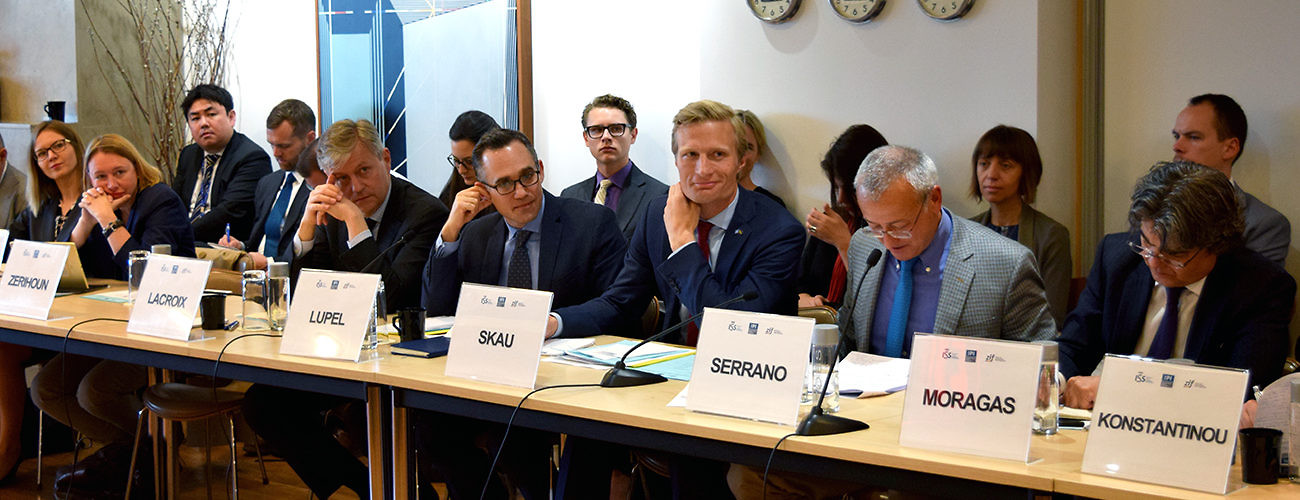Partnership is at the center of current United Nations and European Union efforts to make peace operations and crisis management more effective. In recognition of this, IPI, together with the EU Institute for Security Studies (EUISS) and the Center for International Peace Operations (ZiF), in cooperation with the European External Action Service (EEAS) Crisis Management and Planning Directorate and the UN Departments of Peacekeeping Operations, Field Support and Political Affairs, held a second joint UN-EU expert workshop on 27 April 2018, to discuss how best to follow up on the 2015–2018 Priorities on Strengthening the UN-EU Strategic Partnership on Peacekeeping and Crisis Management.
Bringing together representatives of the UN Departments of Peacekeeping Operations/Field Support and Political Affairs, the European External Action Service, the European Commission, EU Member States, and subject matter experts, the forum recognized that while the current priorities remain largely valid, they require some adaptation and adjustment to new challenges and policy developments. The following are the main insights and conclusions that emerged from the meeting:
UN and EU mandates must become more focused and closely aligned, and, if possible, the roles of both organizations should be delineated and made more complementary. The UN and EU should also cooperate in adapting to new threat environments, such as by strengthening joint messaging and strategic communication, exchanging information, and conducting joint analysis, including cross-fertilization among the strategic reviews.
The UN and EU can use their partnership to better support the primacy of politics, reiterating how peace operations and crisis management are fundamentally tools to advance political solutions and sustaining peace. The prevention element of all operational activities should be clear, with strengthened cooperation on horizon scanning and resilience building. Transition planning should be central to the partnership, with a focus on upstream support and benchmarking to address the root causes of conflict and enable more effective and coherent handover of responsibilities Cooperation on security sector reform must encompass the entire security and justice chain, including the judiciary, prosecution, and penitentiary, taking into account work on the Strategic Guidance Framework for International Police Peacekeeping. Enhanced cooperation on stabilization and greater consideration of the challenges of terrorism and violent extremism as well as organized crime in mission planning and analysis is needed. Participants also agreed that the UN-EU Steering Committee on Crisis Management should maintain its structure and operational focus.
Trilateral cooperation with the AU is crucial, and the UN and EU need to do more to help the AU build its capacities and capabilities to conduct peace and security operations. Learning from the experience of working with the G5 Sahel Joint Force, they should also consider working through more flexible frameworks to support regional groupings in Africa.
Rapid response will remain a necessity, and trilateral cooperation on civilian engagement should be considered in this context. Similarly, in-theatre cooperation could be strengthened by ensuring that technical arrangements better reflect the strategic partnership and reciprocity and by further cooperating on exercises.
Innovative solutions to capacity-building training could allow for further decentralization of activities and continued training post-deployment. But this requires clarity on “what” to train on and broader questions of curricula, standards, and certification. Moreover, should EU missions support UN troop or police-contributing countries with training in the same way they are supporting local forces or the G5 Sahel Joint Force, this would have to be specified in the mission mandate agreed by EU member states.
The women, peace, and security agenda needs to be mainstreamed into the UN-EU partnership. Operationalization of this agenda requires cultural change as well as new approaches to implementation.








